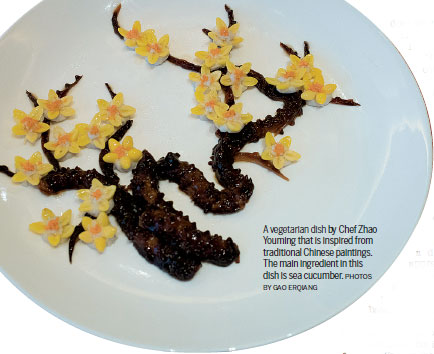Culinary replication at its finest

The Godly restaurant in Shanghai has for almost a century been creating cuisine that look and taste the same as the classics, except for one aspect - none of their dishes contain meat
For nearly four decades, Zhao Youming has been cooking Chinese dishes at the kitchen of Godly with just a fraction of the ingredients other chefs use.
According to Zhao, about two-thirds of the ingredients that are commonly used in Chinese cuisine cannot be used in the kitchen. After all, Godly, or Gong De Lin - it means "a forest of beneficences" in Chinese - is a vegetarian establishment.
But the 63-year-old chef is not complaining. In fact, he said he is "blessed" to be able to work with a limited selection of ingredients.
"Less is more. When we are deprived of a certain number of things, we can be more focused on the task at hand," he said.
There have been more than 300 vegetarian dishes created and recorded by the nearly century-old Godly, the first dining establishment in the city to be certified as a national intangible cultural legacy. About a third of these dishes are now served regularly at two of its catering venues in Shanghai.
In 1979, following China's opening-up to the world, Godly and several other State-owned restaurants were chosen by the government as key organizations to finance and revive traditional Chinese culinary culture.
It was around this time that chef Zhao's father, who had been running the kitchen at Godly for nearly three decades, decided to bring his son into the picture as he believed that cooking in a kitchen had better prospects than being a brick worker, a job the junior Zhao had had for eight years before following in his father's footsteps.
Though his father ran the kitchen, Zhao recalled that he did not receive preferential treatment, pointing out that his apprenticeship was tough.
"We were trained in as many skills as the chefs who cooked with regular meat and fish because we needed to know exactly how those dishes were made before we could create alternative versions with vegetables," said Zhao, who admitted he is not a vegetarian.
As society becomes more aware about health and the environment, a growing number of Chinese are turning to vegetarian diets. As such, private and chain restaurants offering vegetarian cuisines have been mushrooming over the past several years in Shanghai. But chef Zhao does not think Godly is at any risk of losing its perch at the top.
"It's not about competing with others but about staying original and ahead of the curve, just like what we did a century ago when we invented the folk vegetarian cuisine," said Zhao.
Together with a dozen of his apprentices, Zhao introduces between 10 and 20 new dishes every year, and all of them are based on nothing more than four main ingredients: tofu, gluten, mushrooms and bamboo shoots.
"A vegetarian chef is like a movie director. We have the responsibility of discovering the potential of each vegetable and taking full advantage of them in different scenarios," he said.
















